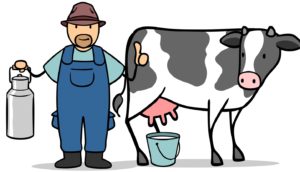Stuff recently published a story entitled ‘Milking it: NZ’s milk price: Who’s getting rich?’ It reported that milk prices were “astoundingly high,” citing that the price for a litre of fresh milk in Germany was the equivalent of $1.51 compared to $2.37 in New Zealand. It quoted Consumer NZ as estimating that for every $3.56 bottle of milk (an average retail price at present) about $1.19 would go to the farmer, $1.91 to the processor and retailer, and 46c to GST.
It quoted one of the key reasons for Germany’s low grocery prices as being high levels of competition with multiple large chains operating there vs 2 here, and the fact that our domestic market is dominated by one big supplier.
Also, that what New Zealand paid was skewed by international prices because so much of what was produced here is turned into commodities for export.
Some points it didn’t make:
- New Zealand has a 15% GST on milk which can be 50 – 85 cents. Many other countries exempt milk or have a much lower rate.
- Exchange rate differences & fluctuations
- Many global dairy farmers receive significant taxpayer subsidies eg UK, Germany, Canada.
- New Zealand is a tiny market (smaller than Sydney) with consumers spread out over a large area (the size of Japan). This increases many costs, particularly for distribution.
- Milk price wars in Australia, UK and Germany have resulted in short-term gains for shoppers, but long-term carnage for their dairy industries.
- Cost increases: With increases to fuel taxes (remember that transport and freight is a significant cost), a series of hikes in the minimum wage and the flow-on effect for other earners, increases in packaging costs, energy and other costs – eventually it has a flow-on effect to prices.

